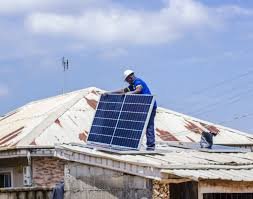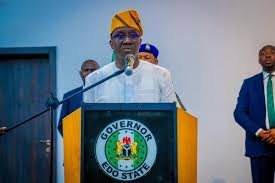
ABUJA, Nigeria – Nigeria stands at a pivotal energy crossroads — where the hum of generators drowns out the silence of a national grid that fails millions.
In a country of over 200 million people spending billions yearly on diesel and petrol to light homes and businesses, a quiet revolution is underway.
From rooftops in Lagos to farms in Kano, solar panels, small wind systems, and clean cookstoves are rewriting the country’s energy story — creating jobs, reviving enterprises, and offering families both relief and resilience.
In this report, Juliet Jacob, explores how a growing network of technicians, innovators, and entrepreneurs are driving Nigeria’s green transition — one solar panel at a time.
The Cost of Powering Darkness
Nigeria’s power crisis has long been both economic and environmental. Frequent blackouts and limited grid reach have forced households and industries into dependence on petrol and diesel generators — a costly lifeline that drains nearly $29 billion annually from the economy.
The consequences extend beyond finances. Polluting fumes, rising carbon emissions, and noise pollution have made generators symbols of both survival and stagnation.
“What Nigerians spend on generators in one year can finance a nationwide solar revolution,” said Ibrahim Musa, a solar engineer in Abuja. “The problem has never been sunlight — it’s always been policy and investment.”
Green Jobs Lighting Up Opportunity
Nigeria’s Energy Transition Plan (ETP) envisions more than 340,000 green jobs by 2030, spanning solar, hydro, wind, and clean cooking. Analysts predict that with strategic investments, that number could surpass one million by 2050.
For many young Nigerians, renewable energy is not just about climate action — it is employment, empowerment, and escape from poverty.
“Every time we install solar, we’re not just powering homes — we’re building futures,” said Eunice Balogun, an electrical engineer in Lagos.
Across Nigeria, solar academies like Wavetra, Blue Camel Energy, and UNDP’s Solar for Development program are training thousands of technicians with internationally recognized certifications — creating a pipeline of skilled workers fueling the green economy.
Homes and Small Businesses Finding Relief
In Lagos, Port Harcourt, Abuja, and Kano, more middle-income households are switching to solar as fuel costs rise.
“I used to spend ₦80,000 monthly on diesel for my shop,” said Ifeanyi Nnaji, a business owner in Enugu. “Now, my 5kVA solar system cuts that cost by half. My nights are quieter, and my profit margin is back.”
A survey by the Nigerian Economic Summit Group (NESG) found that 45% of urban households are considering solar as their main energy source — a shift that could redefine Nigeria’s domestic energy economy.
Clean Energy as an Economic Engine
Renewables are reshaping Nigeria’s economy — from powering micro-enterprises to expanding productivity across critical sectors.
According to energy economists, reducing generator dependency could inject $18.3 billion annually into Nigeria’s economy, particularly benefiting micro, small, and medium enterprises (MSMEs), which employ over 80% of the labour force.
“Solar-powered welding shops and clinics don’t just save money—they expand working hours and create jobs,” Balogun added.
Nigeria is also exploring regional energy trade through the West African Power Pool (WAPP), potentially turning clean energy into a new export commodity.
Untapped Riches Beneath the Sun and Wind
Nigeria’s renewable potential remains vast — yet largely untapped. With average solar irradiance of 5.5 kWh/m² per day, wind corridors across Katsina and Sokoto, and more than 270 small hydro sites, the country holds gigawatts of opportunity.
Community-driven projects — like hybrid solar-hydro systems in Abuja and waste-to-energy plants in Lagos — are proving that sustainable models can thrive locally.
Youth Skills at the Core of the Transition
With youth unemployment at 55%, renewable energy is rewriting the employment narrative.
International partnerships with Germany’s GIZ and USAID’s Power Africa are expanding access to training, mentorship, and entrepreneurship funding.
“The green sector is not just a job — it’s a career for the next generation,” said Ossai Ebinum, a renewable energy expert. “Every solar installer becomes a teacher, every system installed becomes a seed for another business.”
Policy – The Missing Link in the Power Equation
Despite visible progress, policy inconsistencies remain a stumbling block. Import duties on panels, limited financing for local installers, and weak enforcement of renewable energy incentives hinder growth.
“Local battery manufacturing would transform the industry,” Musa said. “Instead of importing everything, we can create jobs and keep value within our economy.”
While the Energy Transition Office has mobilized $3.6 billion in funding, experts say Nigeria needs a coordinated policy roadmap that links infrastructure, manufacturing, and human capacity.
Voices from the Frontline: Lives Transformed by Solar
At Dutse Market in Abuja, Madame Teresa, who runs a frozen food shop, said solar panels changed her business forever:
“Before, I lost money whenever NEPA took light. Now, my freezers run all day. Solar gave me peace of mind.”
For Mr. Ewama, a retiree in Kubwa, solar energy brought more than comfort — it brought stability.
“My wife’s restaurant now runs anytime. We don’t even notice when there’s no public power,” he said.
And for technician Ayoola, each installation represents environmental healing:
“Every panel I install is one less generator polluting the air,” he said proudly.
Expert Insight: The Path to an Energy Secure Nigeria
Speaking with Africa Health Report, energy expert Ossai Ebinum emphasized that Nigeria’s transformation depends on political will.
“These resources — sun, wind, and rivers — have always been there,” he said. “Harnessing them is not a question of capacity but of courage.”
Ebinum believes the ripple effects of clean energy — from employment to community growth — will define Nigeria’s development future.
“Each solar project creates up to five new jobs. If we align policy, funding, and awareness, renewable energy will not just power homes but power prosperity.”
A Brighter, Fairer Future — If We Choose It
Renewable energy is not just an alternative — it’s Nigeria’s lifeline for inclusive growth, job creation, and climate resilience.
To realize its potential:
The government must prioritize local manufacturing, reduce import tariffs, and enforce a clear national renewable energy framework.
Private sector investors must fund innovation and scale micro-grid projects across rural and peri-urban areas.
Development partners must strengthen technical support and youth training programs.
Citizens must see renewables not as luxury — but as liberation from energy poverty.
“Nigeria doesn’t lack energy,” Ebinum concluded. “It lacks the courage to transition. Once we commit, the sun will power not just homes, but a stronger, cleaner economy.”
As the world races toward net zero, Nigeria has a chance to lead Africa’s clean energy revolution.
The path is clear — the question is whether the nation will take it.




